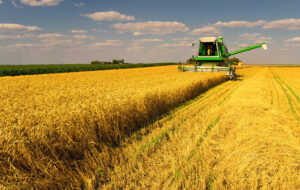WORKERS’ COMPENSATION IN THE AGRICULTURE INDUSTRY
 Workers’ compensation insurance for employers in the agriculture field is normally provided by insurance carriers who market to this field. The cost of coverage is about average (except for livestock farms and stables which runs about double other farming operations). The frequency and severity of claims is comparable with other industries.
Workers’ compensation insurance for employers in the agriculture field is normally provided by insurance carriers who market to this field. The cost of coverage is about average (except for livestock farms and stables which runs about double other farming operations). The frequency and severity of claims is comparable with other industries.
Agriculture operations are found in every state with most businesses tending to be small in the number of permanent employees, but with some large operations with large payrolls. Among the large operations are agri-businesses. These are very different than family farm-type operations.
- Physical hazards include machinery, exposure to insecticides and herbicides, various types of manual labor and heavy lifting.
- Safety issues include those related to working with equipment and/or machinery with moving parts, using proper protective gear and knowing proper lifting techniques.
- Occupational illnesses do occur when proper protective gear is not used with the application of insecticides and herbicides.
Cost of Workers’ Comp Coverage Is Impacted by Seasonal Employees
The workforce of permanent employees is normally stable with experienced long-term employees. The cost of work comp coverage is impacted by the number of seasonal employees who are employed for short periods of time for planting in the Spring and harvesting in the Fall. Most seasonal employees have low levels of education, little or no understanding of workers’ compensation, and no loyalty to the employer due to the short duration of employment. In approximately half of the states seasonal employees are excluded from work comp coverage unless the business purchases a rider or endorsement adding coverage for seasonal employees.
When injuries occur to employees in the agriculture field, medical treatment is often not readily available due to the rural location. In the states where the employer can select the medical provider, the number of choices may be limited due to the low number and location of medical providers, with most states limiting the distance an employee can be required to travel for medical care.
Seasonal Employees with Minor Injuries Return to Work Quickly
Most seasonal employees who receive relatively minor injuries will return to work as soon as they can as they have a limited time to earn their income. The income benefit levels tend to be low for seasonal employees reflecting the low wages they earn. The income benefits for permanent employees will vary depending upon their level within the business.
Agriculture covers many different aspects of farming. Some of the sub-categories of agriculture that would have the same or similar work comp issues include:
-
Dairy farming
-
Egg and poultry farms
-
Animal husbandry of sheep, goats, horses, etc.
-
Orchards and vineyards
-
Vegetable farms
-
Field crops and grains
-
Aquaculture
-
Plant nurseries
-
Greenhouses
-
Fish hatcheries
Transitional / Modified Duties in the Agriculture Industry
There are transitional duty opportunities within the Agriculture industry for restricted employees. If there is an applicable Union Contract (primarily in the west coast states) be sure to review the terms to verify modified duty is not prohibited or restricted. Attempt to modify an employee’s regular job to fit the physician-assigned abilities on a temporary basis. Some modified possibilities may include:
| Field Crop Worker: | Allow employee restricted from field work to sort produce. |
| Fruit Harvest Worker: | Allow employee to work from ground level to extent possible. |
| Tractor Driver: | Have employee take empty trailers to the field and return with full trailers to the silo or barn. |

